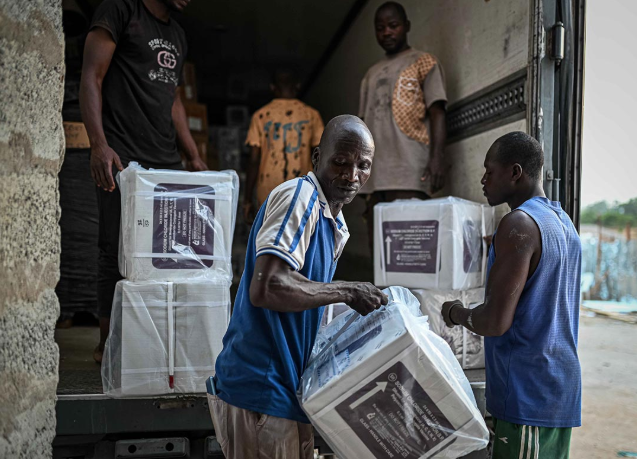The Burnet Institute, in partnership with Gavi, the Vaccine Alliance, has conducted a groundbreaking study assessing the historical impact of emergency vaccination efforts on global health security. Analyzing 210 outbreaks of five infectious diseases – cholera, Ebola, measles, meningitis, and yellow fever – across 49 lower-income countries from 2000 to 2023, the study, published in the BMJ Global Health, reveals the significant benefits of reactive vaccination campaigns. The research underscores the economic and life-saving potential of these interventions, demonstrating an average 60% reduction in both cases and deaths across the five diseases. This impact is in addition to the substantial benefits already achieved through routine and preventive vaccination programs. The study emphasizes the crucial role of swift response times and robust routine immunization coverage, particularly in high-risk areas, for minimizing the human and economic toll of these infectious diseases.
The study detailed the varying effectiveness of emergency vaccination across different diseases. Yellow fever and Ebola demonstrated the most dramatic reductions in mortality, with 99% and 76% decreases respectively, attributable to outbreak response vaccinations. Measles outbreaks saw a 59% reduction in cases and a 52% reduction in deaths, while cholera outbreaks experienced a 26% reduction in cases and a 36% reduction in deaths. Meningitis outbreaks, excluding meningitis A which has been largely controlled through routine vaccination in Africa, experienced a 27% reduction in cases and a 28% decrease in mortality. Critically, the study highlighted that the swift deployment of vaccines consistently reduced the likelihood of outbreaks escalating into larger-scale emergencies, safeguarding public health and global health security.
The financial implications of these vaccination campaigns were also substantial. The study estimated that averted deaths and disability-adjusted life years (DALYs) resulted in nearly US$32 billion in economic benefits. However, this figure likely underestimates the true savings, as it excludes outbreak response costs and the broader socio-economic disruption caused by widespread outbreaks. The 2014 West African Ebola outbreak, which predated the availability of an approved vaccine, serves as a stark example. This outbreak cost West African countries over US$53 billion, demonstrating the far-reaching economic consequences of uncontrolled infectious disease spread. This cost emphasizes the importance of proactive measures like Gavi’s support of vaccine development and stockpiling, enabling rapid deployment during subsequent outbreaks.
The study also provided disease-specific analyses, highlighting the unique challenges and successes of each vaccination effort. In the case of Ebola, the study demonstrated the critical role of vaccines in containing outbreaks since the devastating 2014 epidemic. The availability of vaccines, supported by Gavi, has transformed the response landscape, enabling rapid control and preventing wider spread. Similarly, the study showcased the success of yellow fever outbreak response vaccination, emphasizing the importance of both timely intervention and high routine immunization coverage for maximal impact. The study findings for cholera highlighted the importance of swift response in low-immunity settings, underscoring the need for preventive vaccination strategies alongside investments in water, sanitation, and hygiene (WASH) infrastructure. For measles, the study confirmed the efficacy of outbreak response vaccination in reducing cases, deaths, and, importantly, the risk of large-scale epidemics. This reinforces the ongoing importance of routine measles vaccination to maintain high population immunity levels and prevent future outbreaks. Lastly, the assessment of meningitis outbreaks revealed the impact of vaccination efforts on strains beyond meningitis A, underscoring the potential of newer multivalent vaccines to further reduce meningitis burden and even eliminate certain strains through preventive campaigns.
Looking ahead, Gavi’s strategic plan for 2026-2030 (Gavi 6.0) prioritizes strengthening global health security, building upon the lessons learned from past outbreaks. This includes maintaining and expanding global vaccine stockpiles to cover emerging threats like mpox and Hepatitis E, while also supporting targeted interventions to address the root causes of ongoing outbreaks. Gavi will continue its commitment to securing rapid access to vaccines and providing critical support for future outbreaks through innovative financing mechanisms like the Day Zero Financing Facility and the First Response Fund. These mechanisms have proven invaluable in ensuring a swift and sustained response to recent outbreaks like mpox and will be crucial for addressing future Public Health Emergencies of International Concern.
Gavi’s commitment to maintaining and expanding global vaccine stockpiles is a crucial element of their strategy. By ensuring a readily available supply of vaccines for diseases like Ebola, yellow fever, cholera, meningitis, and measles, Gavi aims to empower countries to swiftly respond to outbreaks and prevent them from escalating into larger emergencies. This proactive approach is essential for protecting global health security and minimizing the devastating human and economic consequences of infectious disease outbreaks. The combination of maintaining stockpiles, supporting targeted preventive campaigns, and ensuring rapid access to vaccines positions Gavi to effectively combat existing and emerging infectious disease threats, contributing significantly to a healthier and more secure future for all.


